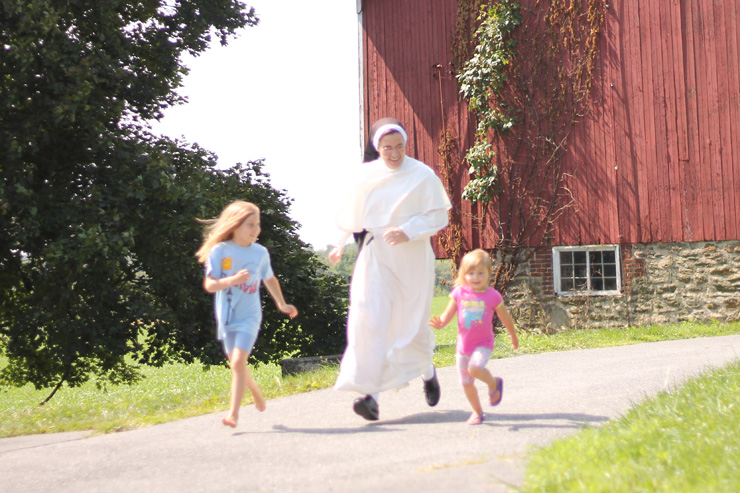I don’t remember much of the arithmetic or history my fifth grade teacher, Sister Matthew Marie, a religious with the Dominican Sisters of St. Cecilia, taught us. But I do remember that when she needed our attention, instead of yelling, she whispered. She sometimes played soccer with us on the playground during recess, and watching Sister run — with her habit billowing in the wind and her rosary beads clinking as she darted to and fro — reduced me to fits of giggles. She couldn’t consistently keep track of the ball because it constantly rolled under her habit. You were foolish to let Sister’s habit or her vocation tempt you to soften your game, though. Sister Matthew Marie was a fierce competitor and she did not embrace the current politically correct tactic to “let” the children win.
On the playing field, Sister was out for blood.
I have a vivid image of her in my mind: she is stooped at the waist — fully clad in her black and white habit — belly laughing at an inane child’s comment, her neck and face tomato red. She thought we kids were hilarious and we knew she took joy in our presence.
My most poignant memory of Sister, though, revolves around our weekly trips to school Mass. I always tried to finagle a spot close to her, because I liked to watch her during the Consecration. When we entered the church, Sister knelt on the pew, and she did something I had never seen any adult ever do before: she closed her eyes and she used her hands to fully cover her face while she prayed.
It was a simple thing, really.
Her head was bowed, noticeably so since it was covered with a thick piece of black cloth, and with her elbows propped up on the pew, she slumped her head in her hands. It was impossible to see her eyes or her mouth, but her body language communicated something sacred: she was having an encounter with a Real Person. For me, it wasn’t Sister Matthew Marie’s habit or her vows of poverty, chastity and obedience that convinced me she had willingly embraced a life set apart for God.
I knew Sister’s life was radically different from the rest of the world because of the way she prayed.
Her example inspired me to imitate her and even today, when I enter a pew, I often cradle my face in my hands and talk to Jesus in private.
Saint Charles Borromeo once said, “Be sure that you first preach by the way you live. If you do not, people will notice that you say one thing, but live otherwise, and your words will bring only cynical laughter and a derisive shake of the head.”
Borromeo was encouraging the concept of practice what you preach, which is especially important when instructing children in the Catholic faith. In my own home, my kids are expert hypocrite detectors and if I’m ever quick to adopt a “Do as I say, not as I do” type attitude, they are quick to point out my double standard.
Then they ignore me.
It’s a grave temptation, I think, for Catholic parents to become so focused on forming our families in the faith that we neglect our own. If we aren’t careful, our families become the little pet projects we throw ourselves into “improving” and “guiding.”
Perhaps we’ve sat through entire lectures or homilies on prayer and our only take away is a renewed effort to get our kids or our spouse to pray more.
Perhaps we’ve shoved books on the spiritual life into the hands of our family members, books we’ve never bothered to read ourselves.
Perhaps we’ve commented on our spouse’s “lack” of Catholic identity and the failures we notice in his or her spiritual life.
Perhaps we’ve shared with others about our spouse’s scattered spiritual focus, the fact he or she doesn’t take the family to Confession, and his or her poor example of Catholic parenthood.
Perhaps we’ve bemoaned the need to “force” our middle schooler to attend Confirmation classes, the irreverence and impiety we see in our children, and their disinterest in the Catholic faith and prayer.
Rarely, however, have we talked about the struggles we face in sitting down and cracking open the work of God ourselves! For all our complaining or even just our silent criticisms about the poor examples of our spouses and our frustration over our efforts to spiritually improve our children and/or spouses, what do our own spiritual lives look like?
Do we dedicate ourselves to daily prayer–with fervor and dedication–or are we focused only on improving those around us?
If we truly want our children to care and feed their own souls, we must ensure we are dedicated to tending our own. We must make daily prayer and frequent reception of the sacraments a priority. We must cultivate spiritual friendships with other Catholic adults, priests, and religious dedicated to the same. We must read books on the spiritual life, go on retreat, write in our journal, and communicate to our families in a million other ways other than our words that our relationship with God is the most important thing in the world to us.
Do you want to keep your kids Catholic?
Decide right now to sit at the feet of Jesus everyday.
Our words, our nit picking, and our reminders to our family often go unheeded, but our example? Our example might inspire our desired result: children who love Christ. And even if it doesn’t, all that time spent on our knees will change us. Besides, when it’s our turn at the pearly gates, God isn’t going to ask us for an account of the prayer lives of our children and spouse.
He’s going to ask us where we’ve been.
The greatest thing Sister Matthew Marie taught me about the Catholic faith came not from her lectures and exhortations or her perfectly crafted lesson plans or the cute cupcakes she brought for liturgical celebrations. The greatest thing I learned about the Catholic faith came from what I saw her doing: from the way she bowed her head in prayer, from the way she threw her head back in raucous laughter at a crazy kid, and from her gentle and calm way of responding to a group of rowdy kids. I think we Catholic parents could take a page from her book when forming our own kids: less talking at them about prayer and more time praying for them…and for ourselves.
















